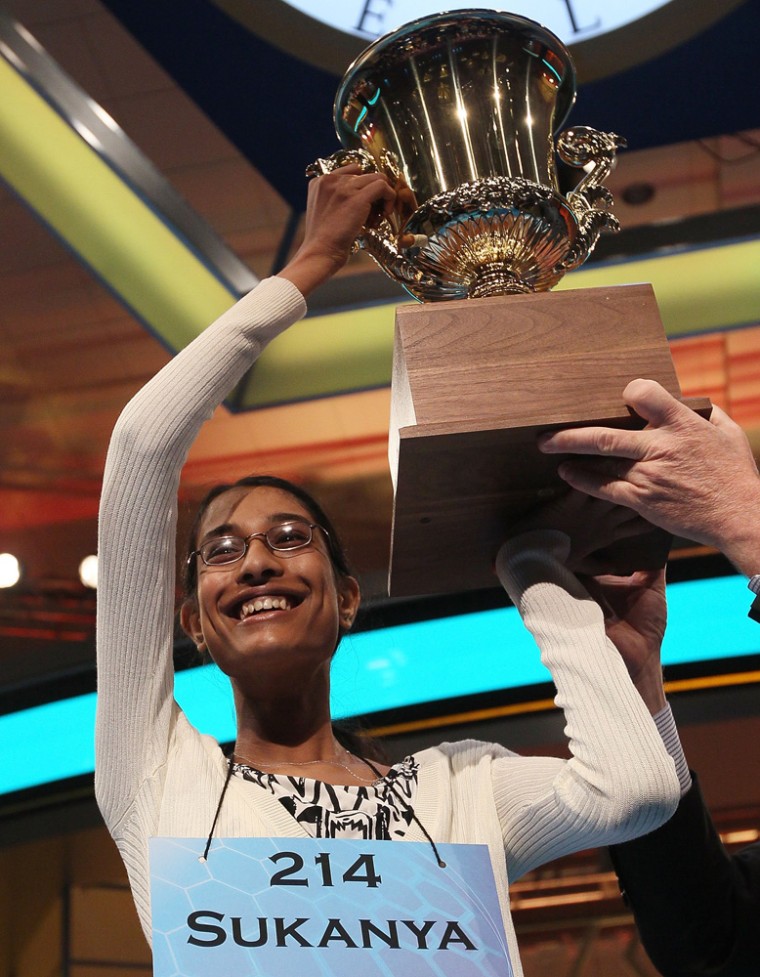It went on and on and on. Five spellers who seemingly had memorized the entire dictionary simply could not be stumped with any word tossed their way. It was getting late, way past bedtime and well beyond the time slot allotted by ESPN.
Finally, after 21 consecutive spellings without a miss, one of them finally flubbed a word. Eventually, the others were gone -- having heard the telltale bell of elimination -- except for 14-year-old eighth grader Sukanya Roy of South Abington Township, Pa., who took home the trophy and the more than $40,000 in cash and prizes.
Sukanya's winning word was cymotrichous, which relates to wavy hair. She likes hiking, rock climbing and ice skating and wants to pursue a career in international relations. She is the fourth consecutive Indian-American to win the bee and the ninth in the last 13 years, a run that began when Nupur Lala captured the crown in 1999 and was later featured in the documentary "Spellbound."
Twelve-year-old Laura Newcombe of Toronto finished second. She was trying to become the first Canadian to win the bee.
A three-time competitor at the bee, Sukanya tied for 12th in 2009 and 20th in 2010.
"I went through the dictionary once or twice," she said, "and I guess some of the words really stuck."
The finals began Thursday night by remembering its first two champions.
With Jeopardy uber-champion Ken Jennings and eight former winners in the house, the bee paid tribute to Frank Neuhauser and Pauline Bell, who both died in their 90s recently. Neuhauser won in 1925 with the word "gladiolus" and Bell won in 1926 with the "cerise," so bee officials placed an arrangement of cerise-colored gladioli at the base of the trophy pedestal onstage.
Then the 13 finalists entered the stage, touching the trophy along the way, took a bow and resumed competing for the spelling crown.
Five finalists battled without a single elimination from round 11 to round 15, but Dakota Jones, 14, of Las Vegas, Nev., was tripped up by the word "zanja."
Arvind Mahankali, 11, of Forest Hills, N.Y, and Joanna Ye, 14, of Carlisle, Pa., were eliminated in round 17 with "jugendstil" and "galoubet" respectively.
Laura stumbled on "sorties" in round 19. Sukanya was then required to spell "periscii" to advance to the final round.
The finalists were all who remained from the 275 spellers from across the country and world who arrived at the start of the week in the suburbs of Washington, D.C. The concluding rounds were broadcast in prime time for the sixth consecutive year.
The spelling bee kids just keep getting better and better. Even words like "chlorthalidone," "dreikanter," "renminbi" and "helichrysum" couldn't sufficiently narrow down the field in the semifinals, which needed 95 minutes of overtime earlier Thursday to whittle the competitors from 41 to 13.
"There were, like, one or two words I'm glad I didn't get, but the ones that I got were fairly easy," said Ye, who was able to say that with a straight face about her words "brachygraphy," "pinetum," "rocaille" and "hypotrichosis" heading into the finals.
"The hard part's yet to come," she added.
Joanna and Laura were the top returning finishers from last year. Laura and another finalist, Veronica Penny of Rockland, Ontario, were each hoping to become the first Canadian to win the bee.
The bee is always a surefire bet for suspense and overall entertainment, which is why the semifinals and finals have become staples for television. Fourteen-year-old Surjo Bandyopadhyay of Lusby, Md., was especially riveting to watch. Presented with the medical term "lysozyme," he blurted out: "May I please have all the information on this word?"
Surjo then shifted his eyes, wrinkled his brow and nodded his head as he listened to the definition, origin and a sentence — then spelled the word correctly. In the next round, he puffed his cheeks, thrust his arms forward and spelled "phyllomancy" so fast that the judges paused for what seemed like forever before nodding their approval, creating such a tension that he had to do a double-take before returning to his seat.
But Surjo went down later in the semifinals, smiling and saying "failed" into the microphone after hearing the telltale elimination bell for his attempt on the musical-related term "nachschlag." He was then escorted to the bee's comfort sofa, where eliminated spellers were welcomed with cookies, water and soothing words from bee staff and family.
One of the interesting new twists at this year's bee: Some semifinalists got to see ESPN's feature profiles of themselves on a big screen while they were airing on television. It might have seemed like a distraction, but it actually served to ease the tension. Grace Remmer of St. Augustine, Fla., giggled as she watched herself enjoying Disney World — then calmed down and approached the microphone, where she correctly spelled "anaphylaxis."
The bee continued to exhibit a sense of humor in the sentences used by pronouncer Jacques Bailly. He used a "set of prison bars for the name Bernie Madoff" in his example for "brachygraphy" and later made a reference to the "The Jeffersons," a sitcom that went off the air some 10 years before the oldest of the spellers was born.
The week began with 275 spellers. A written test Tuesday and two oral rounds Wednesday reduced the field for the semifinals.
